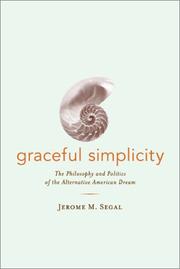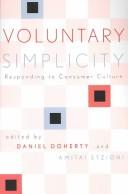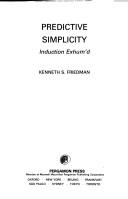| Listing 1 - 10 of 134 | << page >> |
Sort by
|
Book
Year: 2013 Publisher: [Place of publication not identified] : Perlego,
Abstract | Keywords | Export | Availability | Bookmark
 Loading...
Loading...Choose an application
- Reference Manager
- EndNote
- RefWorks (Direct export to RefWorks)
Book
Year: 2013 Publisher: [Place of publication not identified] : Perlego,
Abstract | Keywords | Export | Availability | Bookmark
 Loading...
Loading...Choose an application
- Reference Manager
- EndNote
- RefWorks (Direct export to RefWorks)
Book
Abstract | Keywords | Export | Availability | Bookmark
 Loading...
Loading...Choose an application
- Reference Manager
- EndNote
- RefWorks (Direct export to RefWorks)

ISBN: 0520236009 Year: 2003 Publisher: Berkeley London : University of California Press,
Abstract | Keywords | Export | Availability | Bookmark
 Loading...
Loading...Choose an application
- Reference Manager
- EndNote
- RefWorks (Direct export to RefWorks)
Simplicity. --- Simplicity --- Political aspects
Book
ISBN: 9780691155081 0691155089 0691180822 140088330X Year: 2016 Publisher: Princeton: Princeton university press,
Abstract | Keywords | Export | Availability | Bookmark
 Loading...
Loading...Choose an application
- Reference Manager
- EndNote
- RefWorks (Direct export to RefWorks)
From Socrates to Thoreau, most philosophers, moralists, and religious leaders have seen frugality as a virtue and have associated simple living with wisdom, integrity, and happiness. But why? And are they right? Is a taste for luxury fundamentally misguided? If one has the means to be a spendthrift, is it foolish or reprehensible to be extravagant? In this book, Emrys Westacott examines why, for more than two millennia, so many philosophers and people with a reputation for wisdom have been advocating frugality and simple living as the key to the good life. He also looks at why most people have ignored them, but argues that, in a world facing environmental crisis, it may finally be time to listen to the advocates of a simpler way of life. The Wisdom of Frugality explores what simplicity means, why it's supposed to make us better and happier, and why, despite its benefits, it has always been such a hard sell. The book looks not only at the arguments in favor of living frugally and simply, but also at the case that can be made for luxury and extravagance, including the idea that modern economies require lots of getting and spending. A philosophically informed reflection rather than a polemic, The Wisdom of Frugality ultimately argues that we will be better off—as individuals and as a society—if we move away from the materialistic individualism that currently rules.


ISBN: 1461646782 0742520676 9781461646785 0742520668 9780742520660 9780742520677 Year: 2003 Publisher: Lanham Rowman & Littlefield Publishers
Abstract | Keywords | Export | Availability | Bookmark
 Loading...
Loading...Choose an application
- Reference Manager
- EndNote
- RefWorks (Direct export to RefWorks)
In the past fifty years, the standard of living in most industrialized nations has risen dramatically, but the number of people describing themselves as content has remained steady or fallen. The result has been a growing desire to regain some of the virtues of simpler times, whether by forgoing luxuries, switching careers, or returning to nature. These essays reflect on the different facets of 'voluntary simplicity' and consumer culture, providing an historic view of the movement as well as a social-scientific analysis of its causes and effects.

ISBN: 0080371906 Year: 1990 Publisher: Oxford : Pergamon press,
Abstract | Keywords | Export | Availability | Bookmark
 Loading...
Loading...Choose an application
- Reference Manager
- EndNote
- RefWorks (Direct export to RefWorks)
Book
ISBN: 9780300169348 0300169345 Year: 2012 Publisher: New Haven: Yale university press,
Abstract | Keywords | Export | Availability | Bookmark
 Loading...
Loading...Choose an application
- Reference Manager
- EndNote
- RefWorks (Direct export to RefWorks)
"In this book a noted physiologist and neuroscientist introduces the concept of simplexity, the set of solutions living organisms find that enable them to deal with information and situations, while taking into account past experiences and anticipating future ones. Such solutions are new ways of addressing problems so that actions may be taken more quickly, more elegantly, and more efficiently. In a sense, the history of living organisms may be summed up by their remarkable ability to find solutions that avoid the world's complexity by imposing on it their own rules and functions. Evolution has resolved the problem of complexity not by simplifying but by finding solutions whose processes--though they can sometimes be complex--allow us to act in the midst of complexity and of uncertainty. Nature can inspire us by making us realize that simplification is never simple and requires instead that we choose, refuse, connect, and imagine, in order to act in the best possible manner. Such solutions are already being applied in design and engineering and are significant in biology, medicine, economics, and the behavioral sciences"--
Science --- Complexity (Philosophy) --- Simplicity
Book
Year: 2016 Publisher: Paris cedex 14 (Humensis 170 bis, boulevard du Montparnasse 75680) : Presses Universitaires de France,
Abstract | Keywords | Export | Availability | Bookmark
 Loading...
Loading...Choose an application
- Reference Manager
- EndNote
- RefWorks (Direct export to RefWorks)
La simplexité est une idée neuve, un concept en devenir. Ce volume a l'ambition de donner des pistes pour ancrer la simplexité dans l'action au quotidien, dans le faire. Face à la prolifération actuelle de méthodes pour simplifier et face au constat que la frénésie de simplification aboutit à accroître la complication, y compris virtuelle, il est nécessaire de trouver de nouveaux principes qui permettent de vivre avec la complexité plutôt que de s'acharner à vouloir la maîtriser. Ces nouveaux principes donnent à la tactique une place prioritaire, aux opérateurs et aux opérationnels un rôle clé, quel que soit le métier. C'est un enjeu de société majeur que de réussir à faire simplexe. C'est un enjeu capital pour les entreprises comme pour les organismes de recherche, les États et les individus que de transformer en profondeur leur manière de voir le monde et son évolution, d'envisager leur action et de se lier les uns aux autres. Faire simplexe signifie organiser l'autorégulation de l'action collective, favoriser l'éclosion de propriétés émergentes, reconnaître la force de la subjectivité et de l'émotion.
Book
Year: 1691 Publisher: London : [s.n.],
Abstract | Keywords | Export | Availability | Bookmark
 Loading...
Loading...Choose an application
- Reference Manager
- EndNote
- RefWorks (Direct export to RefWorks)
eebo-0160
God --- Theology, Doctrinal. --- Simplicity
| Listing 1 - 10 of 134 | << page >> |
Sort by
|

 Search
Search Feedback
Feedback About UniCat
About UniCat  Help
Help News
News